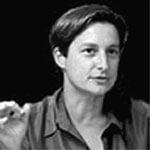Academic’s queer consciousness informs her study of Jewish ethics
All but a few of the hundreds of auditorium seat were occupied for a presentation entitled “Jewish Ethics Under Pressure,” Butler’s first in New York City since 2001. The talk inaugurated the Graduate Center’s new Distinguished Lecturer Series.
Butler, a philosopher who earned her doctorate at Yale, is best known for her pioneering studies in gender and sexuality. Her 1990 book “Gender Trouble: Feminism and the Subversion of Identity” proposed the then contentious claim that gender is nothing more than a performance, or an unconscious drag show of sorts.
“Gender Trouble” and a subsequent collection of essays, “Bodies That Matter: On the Discursive Limits of ‘Sex’,” established Butler as one of the leading scholars in a school of thought that has come to be termed queer theory.
Like many of the academics from the 1990s who founded this field of study, Butler has weathered the attacks of opponents critical of what they describe as her inscrutable style of writing and theoretical approach that offers scant access to practical application.
Butler remains, however, a respected intellectual whose expertise is now elicited outside of the realms of academia by figures in the media and in various activist communities. Rarely, however, do her pronouncements fail to generate controversy.
“I’ll say this before I begin my talk, so that all who feel they must leave can do so now,” announced Butler, clad in charcoal slacks and sweater. “I am not a Zionist.”
However, as Butler launched into her argument against Zionism– at turns philosophical, as well as personal and plainly tactical – about ten seat bottoms flapped up and some listeners left the auditorium.
Butler considered “the role of U.S. Ashkenazi [Jews of Eastern European descent] intellectuals in responding to the Israeli occupation of Palestinian lands,” arguing for “a just peace” in the Middle East and the formation of an Israeli-Palestinian state that accords equal citizenship to Jews and Palestinians. “The occupation surely has to be stopped,” said Butler, referring to the presence of Israeli soldiers in the Palestinian towns of the West Bank and Gaza Strip. At times, Butler made clear that she advocates a nonviolent, non-sectarian approach to settling political differences for both sides in the Israeli-Palestinian conflict.
Butler denounced the actions or rhetoric of extremists who seek to unilaterally control territory through the implementation of armed conflict or by inflaming sectarian passions.
Instead, Butler said, she is concerned with ethics. “Any claim to sovereignty based on religious status is unethical,” she said, adding that the region should be led by “a common desire, taking different forms” which Butler described as constituting a “permanent vision of co-habitation.”
Butler serves on the executive committee of Faculty for Israeli-Palestinian Peace (FFIPP), a collective of Jewish and Arab academics in the United States “endeavoring to achieve just peace and end the occupation in Israel/Palestine and the region.”
“We therefore urge all faculty, and others, who care about the two peoples and the Middle East to support such efforts,” states the FFIPP website.
Much of Butler’s lecture focused on her academic search for models of ethical conduct between Palestinians and Jews found in the work of the noted Jewish ethicists Martin Buber and Emmanuel Levinas. Butler said her goal was to find, as indicated by the title of her lecture, Jewish values that hold steadfast under the pressure of the Israeli-Palestinian conflict. Over the course of her study of the texts of Buber and Levinas, she was disappointed to discover that Buber espoused “concentrative colonialism,” upon Palestinians, while Levinas wrote about the threatening “Asiatic Other.”
In framing the lecture, Butler acknowledged her own Jewish ancestry, saying that while she was raised on religious teachings, she now considers herself a secular Jew. “I came to philosophy through Jewish theology,” she said, recounting how as a teenager she was kicked out of her synagogue for “bad behavior” and readmitted only after agreeing with her rabbi to extensively read Levinas.
The lecturer series continues on March 25 with Dr. David W. Deamer, a biochemist from the University of California, Santa Cruz, who will discuss the origin of cellular life.
William Kelly, the Graduate Center’s provost, said the new lecture program is funded “by a small surplus from last year’s budget.” The Center for Lesbian and Gay Studies (CLAGS), a Graduate Center organization led by Paisley Currah, who is a transgendered man, as well as the Center for the Study of Women and Society, sponsored Butler’s lecture.



































